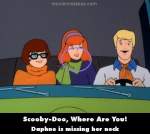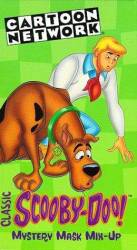Don't Fool With a Phantom - S2-E8
Revealing mistake: When Shaggy has the gang look out the window and tricks them, he is talking and as his jaw moves, an extra layer keeps appearing and disappearing from his nose above the black line of the drawing. (00:17:40)

Don't Fool With a Phantom - S2-E8
Revealing mistake: When Fred makes a joke about the dummies at the end of the episode, Daphne doesn't have a neck. (00:20:55)
Don't Fool With a Phantom - S2-E8
Revealing mistake: When the Wax Phantom first appears on stage, Roger Stevens, the culprit behind the phantom, can be seen at the far right of the stage, even though he should be in the Wax Phantom costume.







Answer: During most episodes of "Scooby Doo, Where Are You?," the gang often split up to explore the latest haunted mansion or abandoned windmill or deserted amusement park. Scooby and Shaggy would generally end up together, Velma would often go off alone, and Daphne would frequently go exploring with Fred. It seemed to be a running theme in the "Scooby Doo" cartoons that Daphne was perpetually flirting with Fred. Fred, however, always seemed much more obliviously preoccupied with finding the next clue, foiling Daphne's amorous intentions. I have always been under the impression that the Scooby-Doo gang was a pretty sexually ambiguous group. More than a few people have suggested that athletic, well-coiffed, ascot-wearing Fred, and bookish Velma were early archetypes of gay/lesbian teens. The show existed in a time when several cartoons suggested sexual ambiguity in its characters: Effete Snagglepuss, a repeatedly drag-wearing Bugs Bunny (who even appeared in TV's first same-sex wedding with phallic rifle-toting Elmer Fudd), prim and polite gophers Mac and Tosh, Peppermint Patty, Marcie, Schroeder and Linus from the "Peanuts" cartoons. But whether or not any then subversive homosexual undertones were ever intended in any of the characters, the oft-paired Daphne and Fred never seemed able to get their relationship beyond the lukewarm stage, much to Daphne's apparent chagrin.
Michael Albert